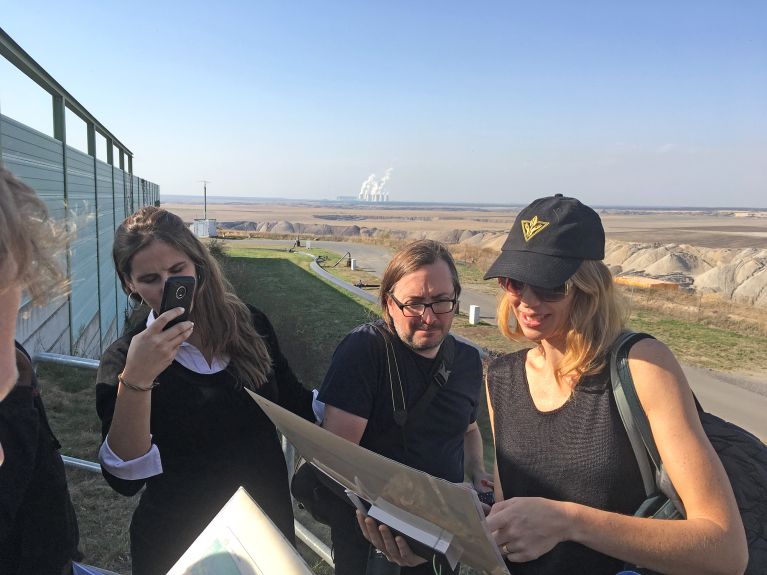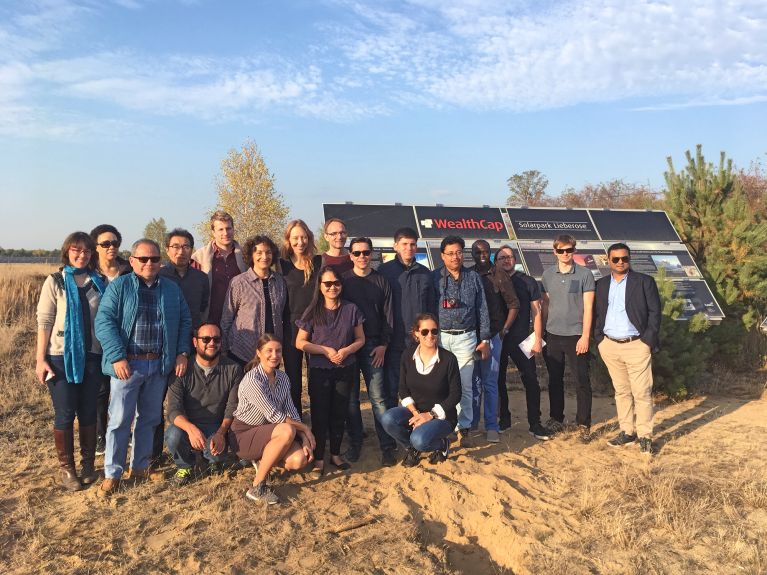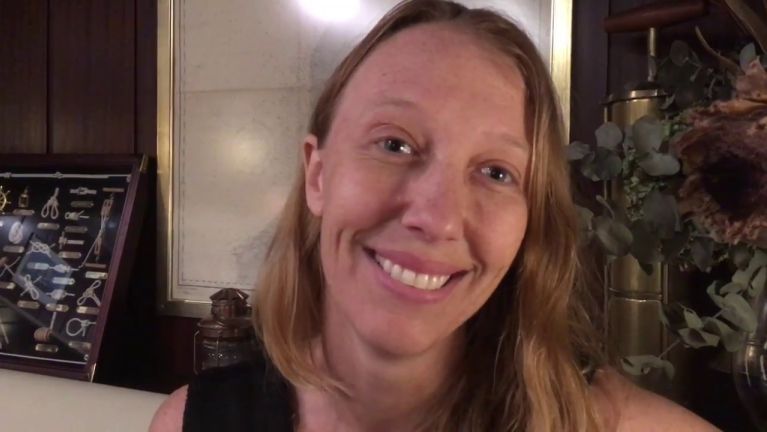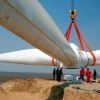Coal mining and the energy transition – can they really go together?
On a trip to Germany’s coal-mining region, international experts discover surprising things about renewable energies and phasing out coal.

Esteban Falconi is astonished. The attorney from Ecuador is one of a group of international visitors to the viewing point on the edge of the Jänschwalde open-cast mine in eastern Germany’s Lausitz region. The 18 participants on the “Climate Policy for 2050” themed trip, organized by the Goethe-Institut as a part of the Visitors Programme of the Federal Republic of Germany, are looking down at Germany’s second-largest brown coal field. Deep in the lacerated landscape, they can see trucks trundling along like ants. In the distance, steam gushes from the towers of the Jänschwalde power plant. With installed capacity of 3,000 megawatts, it is the third-largest power plant in Germany.
Dieses YouTube-Video kann in einem neuen Tab abgespielt werden
YouTube öffnenThird party content
We use YouTube to embed content that may collect data about your activity. Please review the details and accept the service to see this content.
Open consent formA painful goodbye to coal
Sebastian Zoepp, Managing Director of Spreeakademie Cottbus, provides the international guests with some information about brown coal mining in Germany. “Brown coal is still an important part of the region”, Zoepp explains on the bus ride to the mine. When this was part of East Germany, Lausitz played a key role in energy production for the whole country. At the end of the 1980s, shortly before German Reunification, 100,000 people worked in the East German energy sector. “Of that 100,000, today only around 8,000 jobs remain in brown coal extraction, but the region still strongly identifies as an energy-producing area,” says Zoepp. Entirely aside from this, Germany remains strongly dependent on coal as a source of energy – with 22 percent coming from brown coal and 14 percent from black coal
The real difficulty of phasing out coal is getting to grips with the social aspects.
Many of the visitors are surprised by this. After all, Germany is considered an international role model for the successful transition to a sustainable supply of energy. Now attorney Falconi, who fights for the rights of indigenous communities in the face of big corporations hungry for land and raw materials, is not the only one to see clearly that even Germany, the nation of the energy transition with all its technological possibilities, has challenges to tackle. “It’s not about technology; in that regard we know pretty precisely what we need to do,” says Zoepp. “The difficulty is getting to grips with the social aspects of the transformation.”
Wind farm funds kindergarten
In Drehnow, a good half-hour bus ride from the Jänschwalde mine, they’ve had some success in this regard. In 2002 the village of 500 people decided to build a wind farm. The residents reached an agreement with the investor to make ongoing payments rather than pay a lump sum for the operation of the wind turbines, and local companies were involved in the farm’s construction. Each year the population receives a share of the profits, which goes to subsidise a kindergarten. On top of that, each resident gets 2,000 euros a year. “If the framework conditions are right and the cooperation functions well, people perceive the energy transition as an improvement to their quality of life,” says Zoepp.
The extent to which energy projects are dependent on the local specifics of the terrain or the region is made clear in a visit to the Lieberoser Heide solar park. It was here that Germany’s biggest solar park began operations in 2009 – on what was once a parade ground for the Russian army. “It’s certainly impressive, but it was only possible because the parade ground was here,” comments Mohammad Ali Nause Russel, Deputy Director of the Office of the Prime Minister of Bangladesh. “For a project like this, we would have to relocate 100,000 people.”
Dieses YouTube-Video kann in einem neuen Tab abgespielt werden
YouTube öffnenThird party content
We use YouTube to embed content that may collect data about your activity. Please review the details and accept the service to see this content.
Open consent formCoal-producing areas need new prospects
To what extent is Germany a role model for the energy transition? Why does a country that has done so much for the acceptance of renewable energies worldwide still cling to energy extraction from brown coal? These questions were discussed by the guests later in Berlin along with Member of the Landtag for Brandenburg Heide Schinowski (Alliance 90/The Greens), journalist Carel Mohn from the information service Clean Energy Wire, and environmental economist Benjamin Görlach from the Ecologic Institute, among others.
Coal prevents a region from developing.
Schinowski, who herself comes from the Lausitz region, stressed the need for a change of identity in the former coal-producing region. “It becomes difficult without new prospects for people.” Mohn, meanwhile, urged people to question the narrative of the coal industry as a driving force of the economy. “It is noticeable after all that it is precisely the coal-producing regions that lack what is needed to replace coal. So perhaps the reverse is true – that coal prevents the region from developing.”
Global rethink required
Yet is that sufficient to win the race against time that the latest IPCC climate report warns about? This was the question asked by Alexandre Shields, a journalist from Canada, at the end of the themed trip. For Mohammad Russel from Bangladesh, the matter is clear: A global solution can only be found when we stop believing that we can only uphold our quality of life with high energy consumption.

Newsletter #UpdateGermany: You would like to receive regular information about Germany? Subscribe here to:


